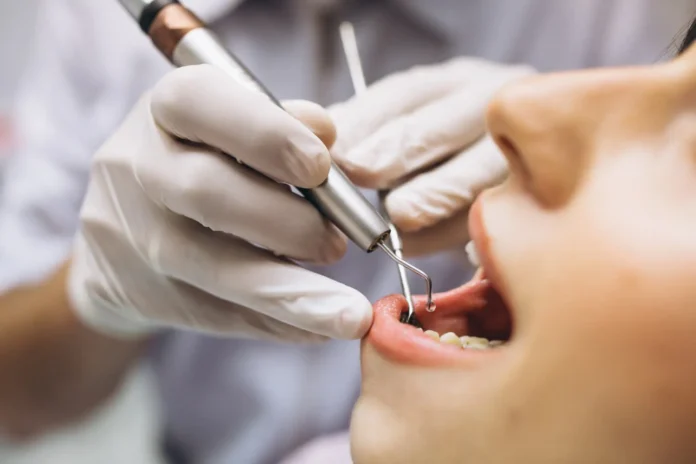A cracked tooth can feel like a dental nightmare. One moment you’re enjoying your favorite snack, and the next, you’re faced with sharp pain or an unexpected sensitivity. It’s startling how quickly something as simple as biting down can lead to distressing consequences. Whether it’s due to trauma, grinding habits, or just wear and tear over time, knowing what to do when this happens is crucial for your oral health.
If you’re in Lake Havasu and find yourself dealing with a cracked tooth, don’t panic! Immediate steps can help manage discomfort while ensuring you get the care you need from emergency dentistry professionals nearby. Understanding the symptoms and causes of a cracked tooth will arm you with knowledge that could make all the difference until you reach the dentist’s office. Let’s dive into what a cracked tooth really means and how to navigate this common dental dilemma effectively.
What is a Cracked Tooth?
A cracked tooth occurs when there is a fracture or break in the hard surface of your tooth. This can happen anywhere on the tooth, from the enamel to deeper layers.
There are various types of cracks. A craze line is shallow and generally harmless, while a more serious crack may extend down to the root, potentially causing pain and complications.
The size and location of the crack determine its impact on oral health. Some cracks might not cause immediate discomfort but can lead to issues over time if left untreated.
Understanding what constitutes a cracked tooth helps you identify potential problems early. When you notice any changes in sensation or structure, it’s essential to seek dental advice promptly.
Symptoms of a Cracked Tooth
A cracked tooth often brings a mix of sensations that can be quite alarming. One common symptom is sudden pain when biting down or chewing. You might feel like something isn’t right with your tooth.
In addition to sharp discomfort, you may experience sensitivity to hot and cold temperatures. What feels normal for other teeth can become unbearable for the cracked one.
Sometimes, the area around the crack might swell or appear inflamed. This could indicate underlying issues that require prompt attention.
When you notice any lingering pain or discomfort after consuming food, don’t ignore it. The symptoms can vary in intensity but should never be dismissed as mere irritation—especially if they persist over time.
Causes of a Cracked Tooth
A cracked tooth can arise from various factors. One common cause is physical trauma, like a fall or an accidental blow to the mouth. This sudden impact can easily fracture even the strongest of teeth.
Another significant factor is excessive force applied during chewing. Crunching down on hard foods, such as ice or unpopped popcorn kernels, places immense pressure on your teeth that they may not withstand.
Teeth grinding, also known as bruxism, can lead to cracks over time. It often occurs unconsciously during sleep and gradually wears down enamel, increasing vulnerability to fractures.
Age plays a role too; as we get older, our teeth naturally weaken due to wear and tear. Additionally, large fillings or cavities compromise structural integrity. The more stress placed on these areas increases the likelihood of cracking when faced with everyday pressures.
Immediate Actions to Take for a Cracked Tooth
If you suspect that you have a cracked tooth, take immediate action to minimize discomfort and prevent further damage. First, rinse your mouth gently with warm salt water. This helps clean the area and reduces the risk of infection.
Avoid chewing on the affected side. Stick to soft foods for now to avoid exacerbating any pain or damage. If you’re experiencing significant discomfort, over-the-counter pain relievers can help manage it temporarily.
If there’s swelling around your jaw or gums, apply a cold compress outside your cheek. This can ease inflammation and numb sharp pains.
Contact your dentist as soon as possible for an appointment. Emergency dentistry in Lake Havasu is available when you need urgent care; don’t hesitate to seek professional help right away.
Temporary Solutions for Pain Relief
If you find yourself with a cracked tooth, managing the pain until you can see a dentist is crucial. First, consider rinsing your mouth gently with warm salt water. This can help soothe inflammation and cleanse the area.
Over-the-counter pain relievers such as ibuprofen or acetaminophen can provide temporary relief. Always follow dosage instructions on the packaging to avoid any complications.
Applying a cold compress outside your cheek may numb the area and reduce swelling. Just remember not to place ice directly on your skin; wrap it in a cloth for protection.
Avoid chewing on that side of your mouth to minimize discomfort. Stick to soft foods and steer clear of anything extremely hot or cold, which could exacerbate sensitivity.
While these solutions won’t resolve the issue long-term, they can make waiting for professional help more bearable.
Treatment Options for a Cracked Tooth
When it comes to treating a cracked tooth, your dentist will first assess the severity of the crack. Depending on this evaluation, various options are available.
For minor cracks, dental bonding is often recommended. This procedure involves applying a composite resin that matches your natural tooth color to fill in any gaps and restore functionality.
If the crack extends deeper into the tooth structure, a crown may be necessary. Crowns provide strength and protection while preserving your original tooth as much as possible.
In more severe cases where nerves are affected, root canal therapy might be required. This treatment removes damaged tissue and seals off the nerve chamber to prevent infection.
Extraction could be considered if all other treatments fail or if the tooth is beyond repair. Your dentist will guide you through these choices based on your specific situation.
How to Prevent a Cracked Tooth
Preventing a cracked tooth starts with good dental hygiene. Regular brushing and flossing keep your teeth strong and healthy.
Routine check-ups with your dentist are crucial. They can identify potential issues before they escalate into cracks or fractures.
Be mindful of what you eat. Avoid hard foods like ice or hard candy, which can put unnecessary stress on your teeth. If you grind your teeth at night, consider wearing a mouthguard to protect them.
Stay hydrated too; dry mouth increases the risk of damage because saliva helps to strengthen enamel.
If you’re involved in contact sports, always wear appropriate protective gear. A simple mouthguard could save you from significant dental emergencies later on.
Conclusion
A cracked tooth can be a daunting experience, but knowing how to handle the situation can make all the difference. Understanding what causes cracks and recognizing their symptoms is vital for timely intervention.
Immediate actions, such as rinsing your mouth with warm salt water and avoiding hard foods, are essential steps while you await professional help. Temporary solutions like over-the-counter pain relief can provide comfort until you visit an emergency dentist.
Treatment options vary based on the severity of the crack; from dental bonding to crowns or even root canals, there’s a tailored approach for every case. Preventive measures play a crucial role in keeping your teeth healthy too—regular check-ups and good oral hygiene practices go a long way.
If you’re facing this issue in Lake Havasu, seeking emergency dentistry services should be your next step. The sooner you address it, the better chance you’ll have at preserving your tooth’s health and integrity. Don’t hesitate—your smile deserves immediate attention!






























